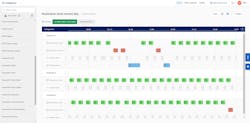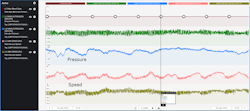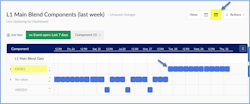Going beyond the data: How self-service analytics plays a critical role in plant communication
Communication and knowledge-sharing between teams and personnel are crucial for optimally running a process manufacturing plant. Stakeholders need to be kept up-to-date with process information and alerted when issues occur — and besides this, maintaining accurate records can be challenging. Consequently, breaking down communication silos is a critical part in preventing process incidents and eliminating disruptions.
Although perhaps not obvious at first, this is an area where self-service industrial analytics can provide a solution. Its unique features monitor processes and sends email alerts when deviations occur, allow for the input of process contextual information, and can even generate automatic process reports. What you get is a highly functioning team that can not only visualize and analyze its data but also leverage the full value of the information whenever necessary.
Spread the information wealth
Industrial processes are complex. They include numerous steps, involve a wide range of systems and technologies, and typically require the input from a variety of subject matter experts. Luckily, however, the rise of Industry 4.0 has paved the way for operational stakeholders to use new solutions like self-service industrial analytics to optimize these complicated processes and continuously improve their operations. With it, they can sort through thousands of sensor readings in a split second and resolve unsolved cases by comparing patterns and events, thus enabling true data-driven decision-making.
Fortunately, self-service industrial analytics goes a step further by making gained insights accessible to the entire organization. With the ability to automatically annotate and label events, lessons from the past can be captured and shared. Customized dashboards, prepared trend views and contextual overviews can be used in day-to-day operations for reporting purposes.
Self-service analytics also provides teams with features they need to communicate locally and around the world, allowing teams to solve problems faster, learn from each other and run their plants more efficiently. For example, an organization’s central analytics team of process experts can be given access to data from remote sites. With the democratization of the data and analytics, they can do their own analytics to generate insights, propose solutions and set up preventive and predictive measures for these sites and where needed. Lastly, self-service industrial analytics can prove invaluable when it comes to adhering to new protocols and restrictions brought on by COVID-19. Engineers and operators working remotely can keep their operations running, without losing productivity or team involvement.
Break down organizational silos
Organizations typically operate in data silos, each with its specific teams and process and business applications. From operations to maintenance and control rooms to lab teams, they all have their own datasets to work with. These silos obstruct a clear and transparent understanding of production and can lead to a slower resolution of issues.
Self-service industrial analytics can help eliminate these communication and data silos by providing a single production overview for the entire organization, no matter where the factory is located (Figure 1). All personnel can be given access to information from different factory sites which allows for local and global collaboration and a much faster, better and safer resolution of production problems.
Automate critical information to improve safety and ease plant management
It goes without saying that safety is essential in industrial plants, and effective plant communication is necessary to ensuring it. A well-designed process will automatically shut down to prevent serious fires or incidents. However, missed communication in safety processes can be detrimental and result in serious injuries or even loss of life. With automated email alerts and early warning indicators available, teams can respond quicker to incidents and mitigate safety risks.
Engineers and operators traditionally use Excel spreadsheets to analyze their data and then communicate findings via emails, presentations and phone calls to get their messages and their information across. While there will always be a place for those systems, self-service industrial analytics provides a platform specific to these operations. And, rather than risk information getting lost between different people and numerous files, a single view for all the information via a personal production cockpit is provided along with automatically generated daily reports. Furthermore, plant managers may not always be available for a phone call when important process information needs to be relayed, so getting the information to them is crucial for effective management of operations.
Case in point 1: Maintaining communication and manufacturing during COVID-19
Toray Plastics is a leading manufacturer of synthetic fibers and textiles, carbon fibers, plastics, chemicals, pharmaceuticals and high-performance films. The company responded to COVID-19 pandemic work protocols by initially cutting the daily office capacity to 50% before reducing this number further. Afterwards, working from home a few days a week became the new normal.
However, Toray’s team discovered performing data analytics from home was no different than being on site thanks to the ease of a self-service analytics solution. Process experts could add process context items to get more information into the hands of colleagues working remotely (Figure 2 and Figure 3). And sharing data trends was extremely helpful in allowing those on site to dive deeper into troubleshooting and to report back to the plant manager.
The self-service analytics’ capability to send alerts also helped keep communication links solid between all stakeholders, both on and off site. If the plant manager could not brief everyone about a certain process behavior, he could set a monitor to send out alerts to the relevant personnel if such a situation developed in the future. With self-service analytics, pandemic work protocols and the transition to working remotely was made considerably easier.
Case in point 2: Diverting serious process issues with automated alerts
While at home one day, a production engineer with global specialty chemical company Kuraray received an email alert about a potential process issue. He drove to the plant and asked his team if they were taking corrective action for the upcoming process issue. They were surprised to see him and wondered how he knew there was an issue. He told them about the email alert from their self-service industrial analytics software that was monitoring their plant’s operations. From the alert, he knew exactly what the critical process problem was. With process monitors and alerts in place, the team was able to take preventive action to avoid a more serious incident.
Alarms are essential in notifying personnel and keeping the plant safe and stable, but not each part of the process has a hard alarm. As a result, issues can be missed by operations, which can lead to costly incidents, disrupting the plant’s ability to deliver a quality product. Self-service industrial analytics can communicate critical process issues to operators and engineers through soft alarms and by sending emails about specific, vital processes to defined groups. As in this Kuraray case, the alert saved 30 hours of unscheduled time of labor and production (Figure 4).
Conclusion
Self-service analytics monitors industrial production and proves indispensable in providing back-up for your team and providing crucial communication of process information. For example, if a distillation column is flooding, causing the differential pressure to rise, a new board operator might not be able to detect that. To cover this potential miss, process experts can set automatic alerts to be promptly informed, so they can reach out to operations to fix the problem before it becomes more significant. This type of communication allows for a faster response from the critical teams in your plants.
Self-service industrial analytics goes beyond the analytics and allows for effective communication and knowledge-sharing on both a local and global level. Automated alerts can increase production efficiency and responses to plant upsets becomes faster, helping to prevent safety and environmental incidents. Additionally, informational silos can be eliminated when process experts can add process contextual information and share their information across all of their organizational levels. Ultimately, keeping plant communication and information-sharing solid is crucial to plant optimization, resulting in smart industrial manufacturing.
Nick Petrosyan is a chemical engineer whose passion is solving problems through collaboration and data-driven decision-making. As a customer success manager at TrendMiner, he draws on his extensive experience in manufacturing and data analytics to lead customers through use case resolution. He holds a Bachelor of Science in chemical engineering from the University at Buffalo.





